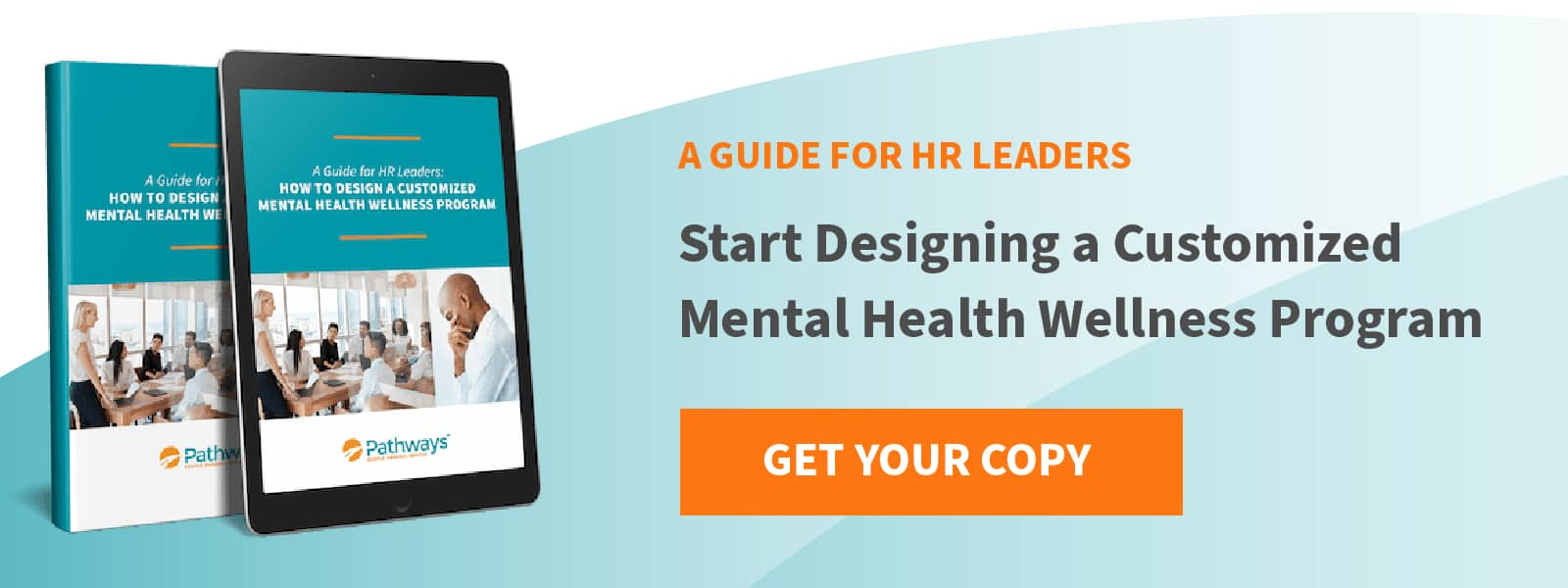Building Emotional Intelligence for HR Leaders in Today's Post-COVID Landscape
Stress and anxiety have long been on the upswing in U.S. organizations over the last several years. However, COVID-19 conditions have increased and accelerated employees' burnout and mental health concerns due to workplace conditions.
Employee Mental and Behavioral Health Wellness Impacts Both Workers and Workplace
Recent data and statistics compiled by Pathways at Work revealed that before COVID-19, approximately 20% of workers would experience a mental illness at some point during the year. Chief mental health concerns pre-COVID were anxiety, depression, substance abuse, and family-related issues.
Even in a pre-COVID world, these numbers had an impact in the workplace. Mental health concerns directly influenced job performance productivity levels, communication with coworkers, and overall engagement for employees.
Employee mental health and behavioral wellness also affected employers before the global pandemic. Through research, the World Health Organization (WHO) found the estimated costs of mental health disorders for employees before COVID were around $1 trillion per year. However, for every $1 invested in scaled-up treatment for mental disorders, there was a return of $4 in health and productivity improvements.
COVID's Impact on Mental Health and Wellness in the Workplace
A recent Pathways survey shows COVID's significant impact in the U.S. workplace. According to the study:
- 76% reported some concern about coping with anxiety
- 74% felt moderately to very concerned about family issues related to COVID-19
- 69% felt moderately to very concerned about work/life balance
- 65% were concerned about financial stress
- 50% were concerned about depression
The rampant upswing in mental and behavioral health concerns has created shifts and disruptions for business owners and HR professionals. Human resource leaders, in particular, have recognized the need to expand their current set of skills and tools. Today's HR specialists realize it's no longer enough to have business, protocol, and compliance proficiencies. To truly support U.S. workers in a post-COVID landscape, HR professionals must also develop a heightened emotional intelligence.
Recognizing the Importance of Emotional Intelligence for HR Leaders
Emotional intelligence is the ability to understand your own and others' emotions and how these emotions drive behavior. HR specialists who have proficient emotional intelligence can use this knowledge to identify workers' needs and motivate them to adopt new behaviors.
The good news about emotional intelligence is that it can be a learned skill. Yes, some people may seem better able to gauge emotionally-driven behaviors than others naturally. However, anyone can commit to improving their overall emotional quotient (EQ). HR professionals can assist other leaders and managers in their company to become more proficient in EQ, reducing the burden on HR.
Some tips for sharpening your emotional intelligence and helping your workforce feel supported include:
Listen and Stay Engaged
Today's employees are struggling with what feels like constant change and uncertainty. Additionally, they may be feeling stress and anxiety about job security, health risks, and family responsibilities — all of which could impact mental and behavioral health wellness. Now, more than ever, HR leaders must practice active, engaged listening with employees to hear their concerns and make them feel supported by corporate leadership.
Take Notice
Changes in behavior can indicate a potential mental health concern. Most HR leaders have firsthand insight into their employees' personalities and performance in the workplace. Condition yourself to pay attention to any signs that your staff members just aren't themselves. Some indicators may be sudden and excessive absenteeism, fatigue, changes in personal hygiene habits, and lowered productivity. You may also notice that someone has been more withdrawn from colleagues or even more aggressive and prone to conflict.
Ask Questions
Most importantly, if you notice that something is off with your employees, it's critical to talk with them about it. Don't offer your opinions or attempt to make a diagnosis. Instead, ask open-ended questions to encourage a conversation with the employee based on the things you've seen or heard that concern you. During this engagement, you can remind the staff member of available resources that the company provides, such as an EAP and virtual visits if available. Making them aware of resources can help them feel supported by the organization.
Emotional Intelligence Takes Time and Practice for Human Resource Professionals
Like all skills, mastering emotional intelligence takes time and practice. HR professionals need to have access to the tools and resources needed to enhance their emotional intelligence and adapt to new trends and changes in the workplace, impacting employees' mental and behavioral health wellness.
Contact Pathways
Pathways delivers the tools and resources HR leaders and business owners need to develop a cohesive corporate wellness program that develops leaders and supports employees. Contact us today to learn more about our customized strategies and solutions.



